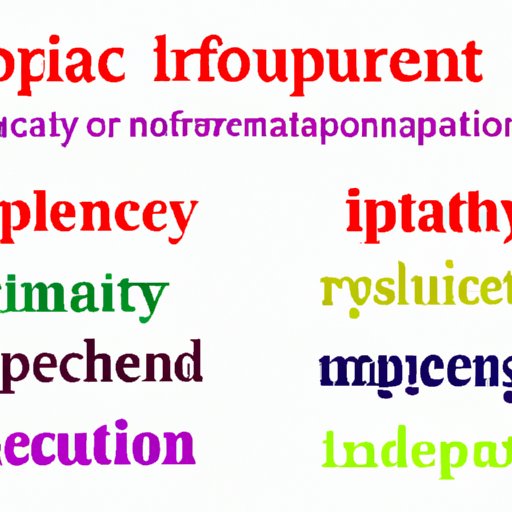Why is Psychology Important? An Informative Guide
Psychology is a field that has been growing rapidly in recent decades, and has come to be recognized as a vital part of our everyday lives. It is the scientific study of human behavior, thoughts, emotions, and motivations, and offers a wealth of practical benefits and insights that we can apply in various areas of our lives. In this article, we will explore the importance of psychology and its relevance to different domains, from healthcare to education to sports and entertainment. We will also discuss the contributions of psychology to understanding mental health and human behavior, and the lifelong benefits of learning about this fascinating field.
Practical Applications of Psychological Principles
One of the most significant contributions that psychology makes to our lives is in improving communication, decision-making, and stress management skills. By helping us to better understand ourselves and others, psychological principles can have a positive impact on our relationships, work, and overall well-being. For example, effective communication is crucial for a healthy relationship or professional collaboration, and involves being able to listen actively, express oneself clearly, and understand the perspectives of others. Many psychological theories and techniques, such as active listening and nonviolent communication, can help us develop these skills. Similarly, effective decision-making involves being able to assess different options and their potential outcomes, based on our values, goals, and priorities. Psychology offers various tools, such as decision-making models and cognitive biases, that can help us make more informed and rational choices. Finally, stress is a common problem that many people face, and can have negative effects on our mental and physical health. By learning about the causes and effects of stress, and how to manage it effectively, we can improve our resilience and coping skills.
Contributions of Psychology to Understanding Mental Health
Mental health is an area that has gained increasing attention in recent years, and many people are realizing the importance of seeking help when needed, as well as promoting more awareness and acceptance of mental health issues. Psychology has played a key role in advancing our understanding of mental health conditions, such as depression, anxiety, schizophrenia, and bipolar disorder, and developing effective treatments and therapies. One example is cognitive-behavioral therapy (CBT), which is a widely used approach that helps people identify and challenge negative thoughts and behaviors, and develop more adaptive coping skills. Another example is mindfulness-based stress reduction (MBSR), which involves developing awareness and acceptance of one’s thoughts and emotions, and has been found to be helpful in reducing symptoms of stress, anxiety, and depression.
Psychology also plays a crucial role in promoting mental health awareness, by reducing stigma and discrimination, and providing accurate information and support to individuals and communities. By educating people about the causes and effects of mental health issues, and encouraging them to seek help and support from qualified professionals, psychology can help reduce the burden of suffering and improve the quality of life of millions of people.
Psychology and Understanding Human Behavior
Human behavior is complex and diverse, and can be influenced by many factors, such as personality, culture, social norms, and environmental factors. Psychology provides a framework for understanding these factors, and offers various theoretical perspectives and research methods that can help us better understand the motivations behind human behavior. For example, social psychology is a branch of psychology that studies how people’s thoughts, feelings, and behaviors are shaped by their social context, such as the presence or absence of others, group dynamics, and cultural norms. By applying social psychological theories and concepts, we can better understand phenomena such as conformity, obedience, prejudice, and intergroup relations.
Psychology also has a role in promoting social change, by increasing awareness and advocacy for different social issues, such as inequality, discrimination, and human rights violations. By highlighting the psychological processes involved in these issues, and the ways in which they can be addressed at individual, group, and societal levels, psychology can contribute to creating a more just and equitable society.
Psychology in Public Policy and Social Systems
Psychology has numerous applications in various public policy and social systems, such as healthcare, education, and criminal justice. By incorporating psychological research and principles into these domains, we can improve the quality of services and outcomes, and address some of the most pressing societal problems we face today.
One example is healthcare, where psychology can help in many ways, such as improving patient-provider communication, promoting healthy behaviors, and reducing stigma and discrimination related to mental health. By integrating psychological approaches, such as motivational interviewing, health literacy, and self-care strategies, into healthcare services, we can increase patient satisfaction and adherence, as well as prevent and treat various health conditions.
Education is another domain where psychology has significant implications, as it can inform many aspects of teaching and learning, such as curriculum design, assessment, and student motivation. By incorporating psychological theories and methods into education, we can enhance the quality and relevance of education, and help students develop critical thinking, creativity, and social skills that are essential for success in the 21st century.
Criminal justice is a third domain where psychology can make a difference, by reducing crime rates, promoting rehabilitation and restorative justice, and protecting the rights and dignity of offenders and victims. By applying psychological principles, such as crime prevention, risk assessment, and trauma-informed care, to criminal justice policies and practices, we can create safer and more humane societies.

Impact of Psychological Research on Various Fields
Psychological research has made significant contributions to various fields, from business to sports and entertainment to the arts. By providing insights into human behavior and motivations, psychology can help us understand why people are drawn to certain products, services, or experiences, and how we can better meet their needs and preferences.
In business, for example, psychology can help in marketing, consumer behavior, and organizational development, by providing theories and tools that can improve customer satisfaction, innovation, and employee engagement. In sports and entertainment, psychology can help in performance optimization, mental skills training, and fan engagement, by offering strategies and techniques that can enhance motivation, concentration, and enjoyment. In the arts, psychology can help in creative expression, audience participation, and cultural diversity, by offering insights into the psychological processes involved in artistic production, appreciation, and communication.
Lifelong Benefits of Studying Psychology
Studying psychology can have many lifelong benefits, beyond the practical skills and knowledge it provides. By learning about psychology, we can develop critical thinking skills, empathy, and appreciation for diversity, that can enrich our personal and professional lives.
Critical thinking involves being able to analyze and evaluate information, arguments, and evidence, and draw informed and reasoned conclusions. Psychology offers many opportunities to practice critical thinking, by exposing us to diverse perspectives, theories, and research methods, and challenging our assumptions and biases.
Empathy is another benefit of studying psychology, as it can help us understand and connect with others, and respond to their needs and feelings with compassion and respect. By learning about the psychological processes involved in emotions, motivation, and relationships, we can enhance our emotional intelligence and social skills, and better navigate the complexities of human interaction.
Appreciation for diversity is a third benefit of studying psychology, as it can foster openness, curiosity, and tolerance towards different cultures, values, and experiences. By learning about the sociocultural and historical factors that shape human behavior and thought, and recognizing the diversity of human experiences and expressions, we can develop a more inclusive and global perspective.
Conclusion
Psychology is a field that is of utmost importance and significance in our everyday lives, offering valuable insights and applications to a variety of fields, from healthcare to education to business and beyond. By understanding the contributions of psychology to understanding human behavior, mental health, social change, and lifelong learning, we can appreciate the relevance and benefits of this fascinating field, and apply its principles to our personal and professional lives.
Final Thoughts: Why Studying Psychology is Essential
Studying psychology is essential, not only for the practical skills and knowledge it provides, but also for the lifelong benefits of critical thinking, empathy, and appreciation for diversity. By learning about the complex and fascinating world of human behavior, we can become better equipped to deal with the challenges and opportunities of our lives, and contribute to creating a more compassionate and just society.
